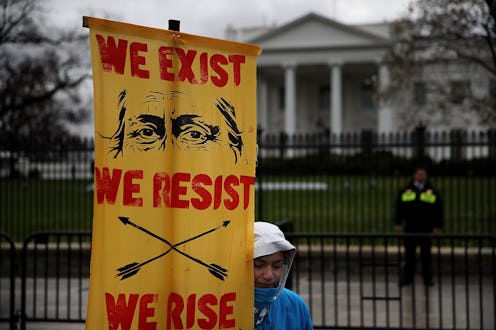
For many Americans, the second Monday in October is celebrated with a day off work, officially to commemorate Christopher Columbus’ voyage to the Americas. But for many people with indigenous heritage, for whom Columbus’ journey brought disease, forced labor, and the destruction of their culture, it isn’t seen as a holiday at all. Activists against the celebration of this day got a major win on Wednesday, when Los Angeles voted to replace “Columbus Day” with “Indigenous People’s Day” on its city calendar, according to the LA Times.
LA joins a number of other cities in the United States who have chosen to end their use of “Columbus Day,” in exchange for more inclusive names that acknowledge the history of native people in this country. Berkeley, CA, has celebrated the second Monday in October as Indigenous People’s Day since 1992, and Bloomington, IN, renamed Columbus Day “Fall Holiday” in 2016. Some entire states, like Alaska, Vermont, and South Dakota, have also made the switch to Indigenous People’s Day, and plenty of people are reacting to the decision in LA by saying it’s long overdue. But, unsurprisingly, there are plenty of people who are really angry about this change.
Italian-Americans in particular were vocal in their opposition to the renaming, the LA Times reported. As Bustle reported back in 2015, Columbus Day was originally instituted during a period of intense anti-Italian-American sentiment in the United States; it was originally a way to celebrate the contributions of Italians to this country. Though Italian-Americans did indeed experience marginalization during the period when Columbus Day was established in the U.S., since that time, the ongoing erasure of the injustices faced by Native Americans from the time of Columbus’ arrival through the present day has become more visible. This has led many people to wonder why we celebrate a day that marks the beginning of over 500 years of oppression of Native Americans, especially since the holiday is meant to celebrate the contributions of a different marginalized group.
One councilman with Italian-American heritage argued that Columbus Day devalues the contributions of his forebears, who came to this country to “build something and not to destroy something,” he said. Joe Buscaino, a first-generation Italian-American who also sits on the council, had campaigned to replace Columbus Day with a name that would celebrate “all of the diverse cultures in the city,” according to the LA Times; his was the only dissenting vote on the 15-person council.
The decision, as anyone who’s been watching the news knows, comes during a renewed push to get rid of Confederate statues, arguing that they memorialize a false narrative of the Confederacy, and erase the actual, shameful history of violence and oppression against Black people in America. The removal of these symbols in spite of the current administration’s defense of them shows how individual cities and towns are able to restore justice on their own terms. Replacing Columbus Day with Indigenous People’s Day can’t undo the violence of colonization against native people in this country, but it does send the message that Native Americans are being seen — finally.